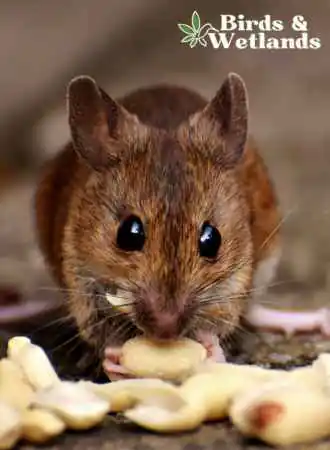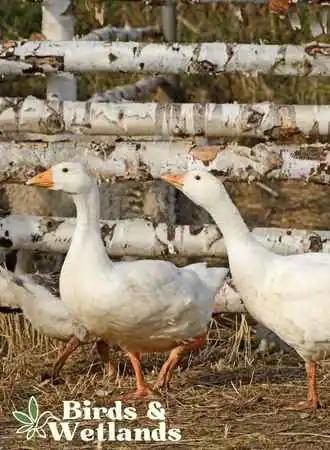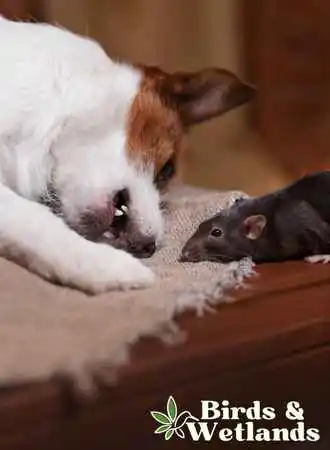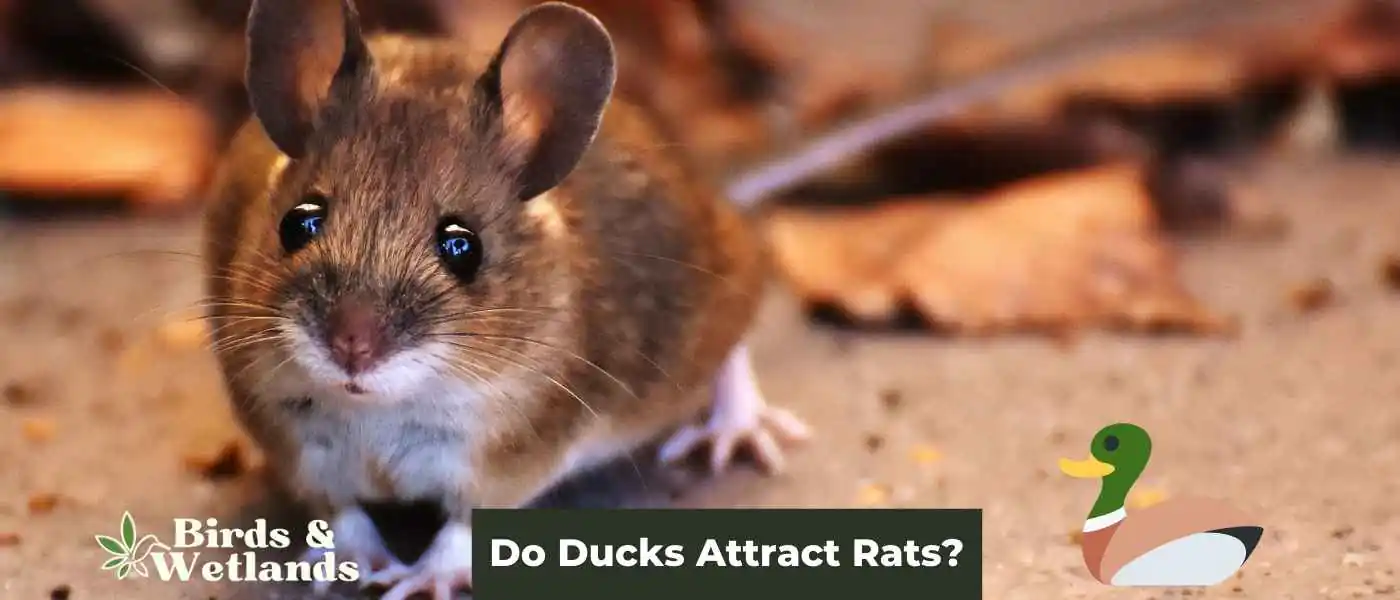While ducks and rats may seem like unlikely bedfellows, the truth is that these two animals often end up sharing the same space.
Yes, ducks can potentially attract rats, but not directly. It’s the food and mess associated with keeping ducks that are attractive to rodents. Leftover feed, droppings, and nesting materials can provide a food source and shelter for rats and other pests. Therefore, proper sanitation and pest control practices are essential when keeping ducks to prevent an infestation.
Key Takeaways on Do Ducks Attract Rats
- Domestic ducks themselves don’t attract rats. But rather, duck droppings, feed, duck eggs, and ducklings are what attract rats.
- Rats tend to cause a lot of problems so getting rid of them is important for the welfare of your ducks. These rodents pose a serious threat to your ducks’ eggs and ducklings.
- Rats may be at the bottom of the food chain, but they have adapted to their environments and often use various tactics to evade predators.
Can Duck Feed or Duck Food Attract Rats?

If you have ever had the unfortunate experience of dealing with a rat infestation, you know these pesky creatures can be difficult to eliminate.
One of the challenges is that rats are attracted to various food sources, including duck feed such as pellets and kitchen scraps. While you may think that the appeal is the duck itself, the smell of the duck feed is what attracts these pesky rodents.
Do Rats Eat Eggs?

As any farmer knows, rats can be a real nuisance. Not only do they steal food, but they also spread diseases and damage crops. Given their reputation, it’s not surprising that they will eat anything they can get their hands on, including duck eggs. Once a rat finds an egg inside the coop, it will come back for more. To protect the eggs, make your nest box or coop rat-proof.
Do Rats Eat Ducklings?
Rats are opportunistic eaters and consume almost anything they can find, including ducklings. While an adult duck can fight off a rat, a duckling is no match for these pests. Rats pose a serious threat to ducks and their young.
If you suspect that you have rats on your property, it is important to take action immediately to prevent them from harming your ducks and their ducklings.
Will Ducks Kill Rats?
Adult ducks have been known to eat and kill rats and mice. However, it is important to note that this behavior is not typical and only occurs if the ducks are raised in an area with a high population of rodents.
Not all ducks are equally adept at killing rats. Typically, the larger breeds of ducks are most successful at hunting down these pests.
Why Rats Are a Problem?
Wild rats are a big problem. They are everywhere and they spread disease. But why are rats such a problem?
- Known to contaminate food with their droppings, urine, and hair.
- Can spread several diseases like rat bite fever, leptospirosis, and the plague.
- Very destructive creatures that can chew through wires, insulation, wood, and other materials.
- Can cause extensive damage to your property and home.
- Eat eggs and young backyard birds such as ducklings
How to Keep Rats Away From Your Chicken and Duck Coops?

There are many ways that you can keep wild rats away from your hens and duck coop. Some of these methods may work better than others, depending on your specific situation. Try out a few of them to see what works best for you.
FOOD STORAGE
Keep all duck food stored in a tightly sealed metal container, as rats can chew through plastic and feed bags.
TREADLE FEEDER
Treadle feeders are designed in such a way that when the bird stands on the lever, it opens the treadle for them to feed. Once they step off, it closes and locks securely.
MANAGE COMPOST
Keep compost heaps for green compost material like grass, green leaves, dead plants, and flowers. You can also use straw beddings, which rats dislike.
CLEANLINESS
Regularly clean your duck coop, ensure there are no grains or feed left on the ground, and keep the surrounding area well-lit at night.
Best Overall Duck Feeder -FeatherEase Automatic Chicken Waterer & Feeder
Simplify Your Poultry Care with One Smart Solution!
Enhance your poultry care with the FeatherEase Automatic Chicken Waterer & Feeder, a convenient and efficient solution designed to keep your ducks and chickens well-fed and hydrated.

Pros
- Simplify your poultry care routine: Dual-function design combines an automatic waterer and feeder in one convenient unit.
- Save time and effort: Large feeder and waterer capacities reduce the need for frequent refill.
- Save money: Innovative no-waste feeding system minimizes feed spillage and waste.
- Long lasting: Food-grade, BPA-free materials ensure the safety and health of your poultry, while the durable constructio.
- Easy-to-assemble and maintain design simplifies the process of keeping your poultry hydrated and well-fed.
Cons
- Users with hard water may experience difficulty in separating the inner cup from the main cup of the waterer due to mineral buildup.
- The feeder’s holes may be too large for some users, allowing chickens to scatter food out, which could result in waste.
- The waterer may not function effectively in colder climates, requiring alternative solutions during the winter months.
- Keep your hens or duck coop clean at all times.
- Close your coop and don’t leave open feed outside at night.
- Don’t leave food inside the coop.
- Replace dirty water regularly.
- Instead hardware cloth on all sides of the coop.
- Place rat poison around the coop. They may die after eating the poison so get rid of the poisoned rat immediately.
- Use rat traps. However, be careful when using either snap traps or glue traps to make sure your birds don’t get into them.
- Hang metal sheeting or chicken wire around the coop.
- Install a rat fence.
- Use electronic rat repellents.
- Get rid of food sources and waste from open spaces and the surrounding area that might attract rats.
- Use a rat-proof chicken wire around the bottom of the coop to keep rats from getting in.
- Keep your hens and ducks healthy so they can defend themselves better.
- Use natural predators to keep the rat population down.
- Store feed properly. Not all containers are created equal. Use covered metal containers instead of plastic as storage containers for your duck or chicken feed.
TRIXIE Pet Products Natura Duck Coop
Are you looking for a reliable, safe, and accommodating living space for your ducks? The TRIXIE Pet Products Natura Duck Coop is the perfect abode that combines function, comfort, and durability, ensuring your ducks enjoy their surroundings.

Pros
- Spacious Design: The TRIXIE Pet Products Natura Duck Coop provides ample space for your ducks to roam and rest comfortably, promoting their well-being and happiness.
- Convenient Cleaning: With a pull-out plastic tray, this duck coop makes cleaning a breeze, helping maintain hygiene without the usual hassles.
- Robust Construction: Made of glazed pine, this coop is built to withstand the elements, ensuring a long-lasting and sturdy home for your ducks.
- Security: The hinged roof with locking arm can be opened from above, providing easy access while also ensuring your ducks’ security against potential predators.
- Easy Assembly: With all necessary hardware included and a detailed instruction guide, setting up your TRIXIE Pet Products Natura Duck Coop is a simple and straightforward process.
Cons
- Size Limitation: While the TRIXIE Pet Products Natura Duck Coop offers ample space, it may not be suitable for a large flock of ducks. Owners with a significant number of ducks may need to consider additional or larger housing options.
- Lack of Insulation: The design of the coop may not provide adequate insulation in extremely cold climates. Additional measures may be necessary to keep your ducks warm during harsh winters.
FAQs on Ducks and Rats
Do Cats Scare Away Rats?
While ducks are a popular pet for many people, they can also be a target for predators such as rats. Rats are attracted to ducks, their eggs, and droppings. These rodents can cause a lot of problems for your and your ducks.
Fortunately, barn cats can help to keep rats away from your backyard or garden. They will catch and kill any rodents they see.
Cats also have a strong sense of smell and typically mark their territory with urine. This scent is unpleasant for rats, and it will usually keep them away from areas where cats have been. So, having a cat around your duck coop can help to deter rats from coming nearby.
Do Dogs Scare Away Rats?

If you keep ducks as pets and they attract rats onto your property, then you have a rodent problem on your hands.
Getting rid of rats can be difficult and frustrating. Though they are small, rats can cause a great deal of damage and may even spread disease. Many people are willing to try anything that might help get rid of these pesky pests.
One popular method is to keep a dog in your backyard garden. The thinking is that dogs will chase away the rats. And while many duck owners found success at keeping rats away from their properties, this method of repelling rats is far from foolproof.
In some cases, using dogs to deter rats has the opposite effect. The food that the dogs leave behind can attract rats. So, having a dog on your property may not always be the best way to keep rats at bay.
Do Chickens Scare Rats Away?
No, rats aren’t scared of chickens. Chickens can’t do anything to scare away rats. So keeping chickens in your backyard may not be a good idea if you want to keep rats away from your property.

